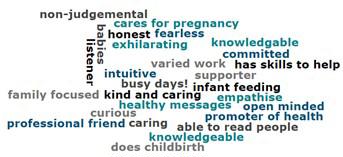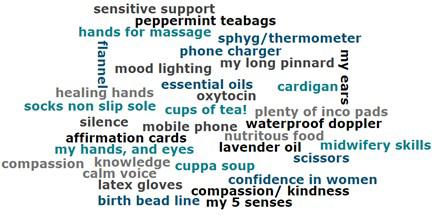Dr Lucy Hope is a Principal Lecturer in Midwifery. In this Academic Blog she discusses the diverse role of the midwife and invites you to find out more about a career in midwifery.
Midwives have been midwifing since the dawn of time. It can be said that women (usually) have supported women through pregnancy and birth ever since… ever since. There are many wonderful and diverse cultural traditions around birth which are interesting to explore – giving birth in more remote locations has meant that those living there have had to be creative about using resources – but wherever women/people are pregnant and give birth, it has been shown that having a midwife at a birth makes it safer for both the parent and child (children if there are twins or more!).
So, what does a midwife do? We can all probably easily imagine midwives caring for women and people who are in labour and giving birth, there are lots of reality TV shows that focus on this momentous time in people’s lives. This is a wonderful experience to be part of as a midwife, it is an honour to care for women and people at this time, yet it is only part of the midwife’s role. Midwives have a central role in sharing information with women and their families and providing care throughout pregnancy, birth and after birth to help optimise health and wellbeing.
The definition of the term midwife is ‘with woman’ and this tells us a lot. In the UK, midwives are often the first person that women/people tell they are pregnant and this marks the beginning of an important relationship. Some NHS Trusts are offering a model of care called continuity of carer which means each woman/pregnant person will be cared for throughout their pregnancy, their labour and birth and for the first four weeks following birth by the same pair or small group of midwives. This model of care has a sound evidence-base, and women/people describe finding this a very satisfying way to be cared for. You can read more about the Herefordshire and Worcestershire Local Maternity and Neonatal System on the BirthWays website.
The role of the midwife is really diverse, and midwives can specialise in a specific expert role, or move between them. These specialist roles can be linked to infant feeding, bereavement care, quality and safety, workforce needs, fetal monitoring, safeguarding and so much more. Midwives work in hospitals, and in the community visiting women/people in their homes and providing care and support. Midwives also work in research, developing new ideas for research projects and supporting the collection of data to inform the provision of care. Some midwives also work in education, providing teaching and training to undergraduate students, those on master’s courses and individual short courses too.
The UW midwifery teaching team got together to think about the words we associate with being a midwife….

And because everyone loves supporting women/people to give birth here are some things that we bring to a birth, some of which you may not be familiar with, and others which may interest you…

Being a midwife is a supremely rewarding job, midwives are respected professionals that advocate for women and their families. We would love to welcome you to one of our open days where you can ask as many questions as you like about the role. Come see us!
Find out more about the School of Nursing and Midwifery at Worcester